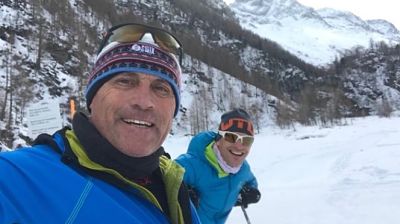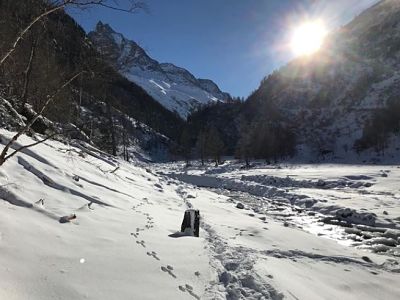Bernie Shrosbree served in the Royal Marines' Special Forces Unit for 16 years and has enjoyed a wide and varied career in sport; he competed in biathlon, represented the GB Nordic team, captained the British triathlon team and competed at the Commonwealth Games in Auckland in 1990, while he was also a three-time winner of the UK's Survival of the Fittest TV contest in the mid-1980s.
So, who better to ask about the value of cross training than the Performance Coach who has put the likes of Mark Webber, Ben Fogle, James Cracknell, Pippa Middleton, Jenson Button, and a young triathlete called Andy Blow through their paces...
Hi Bernie, Andy said you're the man to speak to when it comes to cross training. So, what's the best format of cross training for athletes?
Andy wants to expose my hidden secret doesn't he? I told him years ago, “don’t tell everybody about cross-country skiing”.
People might look at me now and think, 'Bernie Shrosbree, he’s old [he's actually a youthful and very active 60 years of age], what does he know?'
But I believe to this day, if anyone really is serious about making it in triathlon, you can’t just keep going out there running, cycling and swimming the miles. You’ve got to look at alternative sports and I view cross-country skiing as a magic gem that I’m glad most people still don’t know about, because it means my athletes gain an edge.
I know that some of the best athletes in the world are saying the same thing as me - "keep it quiet, don’t tell anyone, we’re cross-country skiing during the winter."
Should we be swapping the running shoes and clip-ins for ski's during the winter?
What you'll ideally want to do is take some 'downtime' during October and November, before looking to move into that 'conditioning phase' in your winter. If you were to go away and do 10 days of ski mountaineering or cross-country skiing in this phase, you will see huge cardiovascular, VO₂ and strength improvements, and that can only be of benefit to you, whether you're a triathlete, cyclist or a runner.
The strength gains from doing a 1,500-metre climb at 3,000 metres of elevation, as well as two hours of continuous skiing, are incredible and the physiologists have noticed how much more power you can pump through the ergometers.

Cross-country skiers often have the highest VO₂’s of athletes and I know VO₂ is a very individual thing, but what you have to remember with this sport is that it involves something called peripheral heart action, so you’re working high ends with your legs and with your upper body. It’s a very different and dynamic sport which will compliment your swimming, running and cycling.
It also improves your ROM [Range Of Movement] and the other little nugget to remember is that skiing usually provides the added benefits that training at altitude brings.
Alongside the physical benefits, could there be an argument for cross-training offering an athletes an opportunity to try something new and get out of their 'box'?
Do you want to go and sit on your bike for 4 hours on a cold, wet day or do you want to go out in minus-10 on a beautifully crisp, dry, cold day? You can wrap up when cycling but you’re going to get damp because the air is moist, whereas the Alps or Norway - once we're able to travel again - offer a beautiful setting, a chance to get out of your box and try a fresh approach. For me, there are huge psychological benefits. You’re in this incredible environment with clean air; it's all really good mindful stuff.
It also helps you mentally as you have to remain calm because cross-country skiing is not a sport where you can just ‘throw down’ and attack, so the focus is on posture and remaining efficient technically.
Ultimately, I've done triathlon, cycling, multi-sport activities, kayaking, and even to this day I spend the winter away and do my conditioning training on the snow.
I must emphasise that it’s not just a case of going out to the Alps and falling on your arse for a few days. You do need to get technically coached, there’s a lot of technique to the sport, but once you’ve listened and have been coached properly you can gain so much.
You've worked with a vast array of athletes in your role as Performance Coach, do you have a particular set of principles that guide your training?
Technique, technique, technique...
I was a good runner in my younger days and I went out to Norway for a summer training camp, where we would run around with our poles on the loops because it was drier. I remember passing the Norwegian team who were focusing on technique but they looked like something out of a John Cleese movie and I said, ‘Hey Norway, you look like you’re running with your pole up your arse’ and they laughed…
In the winter of that year, we went to an amazing training place in Finland and I was doing eight by two-minute intervals after a long ski, and I started skiing hard up this climb. The whole of the Norwegian ski team passed by me as if they were just doing a warm up and one of them tapped me on the backside and said, "hey English boy, you ski as if you’ve got both poles up your arse".
That made me realise how important it is to be technically efficient and it’s a principle that has stuck with me all my life; it was a good lesson for me to learn as a 19-year-old.
And how would you describe your own approach to coaching?
Bernie Shrosbree was a ‘lazy athlete’. In other words, I used to train so hard without getting anywhere. When I first took up triathlon I was crap at swimming so I just swam more and more kilometres. But I learned eventually that technique is key and it takes time to perfect; it was a lesson I learnt the hard way.
Anyone can hurt at different levels but it’s all about how technically efficient you are, whatever your sport.
People can get their off season very wrong because they start following training programs from magazines and, from my own experiences as a coach, I’ve seen triathletes at the pool set out to swim for an hour and they just smash themselves in that session without even thinking about technique or swimming within themselves to become technically better.
Sport has obviously moved on and become more data-driven but you have to learn to ride and swim properly first, before you start looking at data. It’s great to collect the data to determine where you’re at, but you need to strip it back and feel the sport, rather than let it decide what you're going to do next.
Ultimately, what people have got to learn is to be efficient in their sport.
Was it hard to get the athletes to 'buy in' to cross-country skiing when it was something that was completely alien to their own sport?
I’m lucky enough to surround myself with some of the greatest endurance athletes in the world and we all schedule our year around cross-country skiing.
For example, I worked with Jenson Button and he hated me when he was a younger driver and we were going up those mountains. He soon got it though and you look at Jenson now, he’s done triathlons since retiring from motor sport.
I also worked with the men’s GB Olympic rowing team for 7 years and the other rowing teams – the Germans and the Norwegians - believed in what we’re doing so much that they started to follow suit.
It wasn't easy to get 'buy in' from the rowers and they were quite prickly at first as I’d drag them out on the mountains for 30km a day and they’d say ‘who’s this bullsh*tter? What’s he on about?’ Their work ethic was amazing though and I soon earned their respect once they saw the benefits.
They'd only be racing about 2 kilometres in their events but their actual output in training sessions was remarkable. An example of their daily routine would be a 30-35km ski session with me, followed by a 15km 'ergo' session where they’re only doing 18 strokes a minute, followed by a heavy weights session.
For the rowers, the dynamic and the endurance power you get from cross-country skiing is invaluable. So, you can build your strength and muscles through cross-country skiing, which can only be a benefit to a cyclist or a runner who wants to improve their performance going up hills.

Beyond improving performance, could cross-country skiing be a useful alternative sport when recovering from injury?
Mark Webber has been cross-country skiing and he used it for recovery after injury. Mark had a really bad accident as he broke his leg in an adventure race and he was one of the top F1 drivers in the world at the time, so he had to find a way of getting fit ahead of the next Formula 1 season.
Getting him out on the bike would have been dangerous with his injury, so he really benefited from us mixing things up by taking him skiing in Pontresina, where Lance Armstrong used to own a place and many of the top French, German and Italian cyclists use it as their training ground during the off season.
Some people might have a knee surgery or an injury and think, ‘oh, I can't run’. Don’t worry about the running, go cross-country skiing, it’s worth the investment. It's a great way of mixing things up because it involves mobility and dynamic movement, while also involving low impact on the joints.